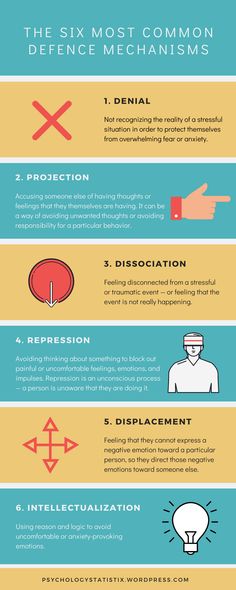Defense mechanisms
Defense mechanisms
Defense mechanisms are unconscious psychological strategies that individuals use to protect themselves from anxiety or uncomfortable thoughts and feelings. These mechanisms can help mitigate distress, but they can also distort reality, potentially leading to maladaptive behaviors if overused.
Here are some common defense mechanisms:
Repression: Involves unconsciously blocking unwanted thoughts, memories, or feelings from conscious awareness. For example, a person who has experienced trauma might not remember the event because it's too painful to think about.
Denial: Refusing to accept reality or facts, thus avoiding painful feelings or events. For example, someone with a serious illness might deny the severity of their condition.
Projection: Attributing one's own undesirable thoughts, feelings, or motives onto another person. For instance, someone who feels hostile towards others might accuse others of being hostile toward them.
Rationalization: Justifying behavior or feelings with plausible explanations, even if these are not the real reasons. For instance, a person who didn't get a promotion might claim they didn't want the job anyway.
Displacement: Redirecting emotions or impulses from a threatening target to a safer one. For example, a person angry with their boss might take out their frustration on a family member.
Regression: Reverting to behaviors from an earlier stage of development when faced with stress. For example, an adult might throw a temper tantrum when things don't go their way.
Sublimation: Channeling unacceptable impulses or desires into socially acceptable activities. For example, someone with aggressive tendencies might become a professional boxer.
Reaction Formation: Behaving in a way that is opposite to one's true feelings. For example, a person who feels insecure might behave overly confident to hide their insecurity.
Intellectualization: Avoiding emotional distress by focusing on facts and logic rather than dealing with the emotional aspects of a situation. For instance, a person who is diagnosed with a serious illness might focus entirely on learning about the disease rather than addressing the fear or sadness.
Identification: Adopting the traits or behaviors of another person, often someone who is perceived as stronger or more capable. This can help the individual feel more secure or less vulnerable.
These mechanisms are part of how people cope with internal conflicts and stressors, but excessive reliance on them can hinder emotional growth and healthy psychological functioning.











.jpg)
Comments
Post a Comment